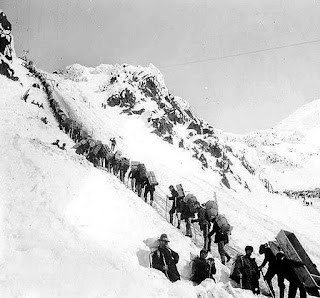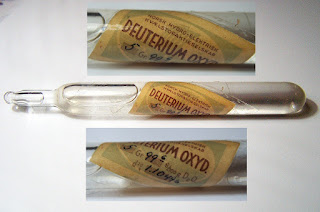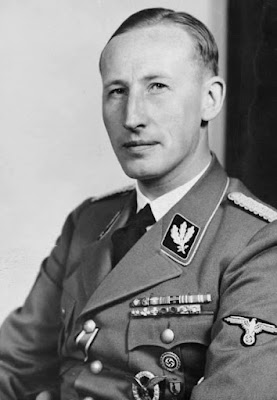They were running out of beer.
 |
| Nicholas and his wife on their wedding day. This picture demonstrates their deep, passionate mutual acceptance of their marriage. |
It's a recipe for disaster when you have that many people in a tightly packed space all trying to reach one spot, and it's only turning up the heat when the desired item in question is of limited quantity. In spite of the police's best efforts to hold back the mob, a stampede broke out in the field. 1,389 people were trampled to death, making Nicholas' reign begin in a dreadfully bloody, tragic fashion. The following is an excerpt from his journal, writing on the incident.
"Until now, everything was going, thank God, like clockwork, but today there was a great mishap. The crowd staying overnight at Khodynka, awaiting the start of the distribution of lunch and mugs pushed against buildings and there was a terrible crush, and awful to say trampled around 1300 people! ...I had to make a speech, and then another for the assembled marshals of the nobility. After going around the table, we left for the Kremlin. Dinner at Mama's at 8. Went to the ball at Montebello's. It was very nicely arranged, but the heat was unbearable. After dinner, left at 2."
This was the world of Russia. On one hand there was incredible, stunning decadence. On the other, 120,000,000 peasants, dirt poor, unable to speak out for rightful fear of punishment and unable to write on their troubles because most weren't even literate. Those at the top saw the other end of the spectrum as an infinite supply of expendable resources to fund every wish. Those at the bottom were meant to prop those above them up on their shoulders. That was the way it was, the way it always has been and the way the Romanovs meant to keep it. Nicholas wholeheartedly meant to keep it that way.
It's not too tough to understand how that came to be. As a child, he didn't so much set foot in a store, meaning he had a shocking knowledge gap when it came to monetary value. This is especially odd considering how the vast, vast majority of the inhabitants of the country he was to inherit were going through tremendous economic hardships. That, again, is strangely understandable; Nicholas was sheltered to such a degree that he would only be subjected to seeing other royalty, servants, and military men. This was something that would plague the future tsar for the rest of his life - a total lack of knowledge (and thus, compassion) for the world that was crumbling around him. There were bits and pieces that must have given him some hint, of course. After all, his grandfather was killed in a terrorist bombing and bled to death right in front of him at a very young age. However, that was somehow not a wake up call that perhaps there was more a growing discontent.
 |
| Tsar Nicholas and King George. Nicholas is the bearded, short-haired white guy with the big moustache. |
Russia's unrest eventually culminated into riots and rebellions, some peaceful, others not. Instead of facing the problem head on, Nicholas retreated and doubled-down on his policies. He would limit freedom of the press and did his best to repress the government. Dissenters were dealt with bruatally, often in the form of assassinations. Groups could be subjected to wholesale slaughter. The most egregious example of this came from his treatment of a peaceful, unarmed protest led by a priest. They came with a list of grievances for the tsar, approaching his Winter Palace in 1905. Imperial soldiers fired on the crowd, resulting in around a thousand casualties, and would prove to be the spark that would ignite the Russian Revolution.
All the while, Nicholas was mostly walling himself off literally and metaphorically. He would often retreat to Tsarskoe Selo, his home away from home in St. Petersburg (more like palace away from palace). There, he was somehow oblivious to just how bad things were getting around him. That is, until it all came crashing down. Eventually forced to abdicate after the incredible losses his army took in World War I, he went into exile. Denied entry into Britain, revolutionaries eventually tracked him down and murdered not only Nicholas but his entire family. It was said that so many jewels adorned the dresses of his daughters that they survived the first wave of bullets from the firing squad. They were subsequently bayoneted.
But I can't end it there. While I've been scathing in this blog post, Nicholas had his moments where he didn't seem all bad. He was undeniably a doting husband and a real family man (the story also goes that he died trying to protect his kid). He seemed genuinely concerned with keeping his family intact. (This includes his extended family. Keep in mind Wilhelm was his cousin. Even as the war was about to begin, he would still sign his letters to him with things like "Your affectionate, Nicky".)
Perhaps this was what led to his canonization. No, I'm not kidding. In 2000 the Romanov family was delivered into sainthood by the Russian Orthodox Church, naming him Saint Nicholas the Passion-Bearer. The same man who brought on Bloody Sunday; who allowed pogroms, the vicious mob attacks against Jews; whose reign was so terrible and bloody that it led to a revolution that only served to cause the deaths of countless more.
I guess baffling love of royalty extends beyond the borders of Britain and Canada.






























